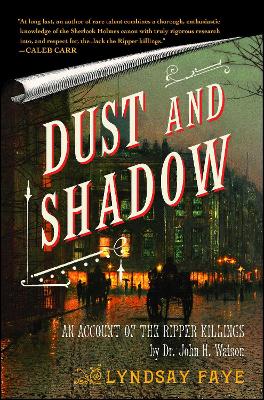Reviewed by brokentune on
However, there was a point where Faye's grumpy version Holmes (not how I see the original character, but it may well be how Faye interprets him) hooked me right back into the story.
The book really wasn't bad at all, which is probably the first time ever I say this about a Holmes pastiche.
I still had a problem with mixing in real characters or events with fiction, and since this story focuses on Holmes hunting down Jack the Ripper the plot was always going to be at the risk of not working for me. That said, if someone was tying Holmes in with real historical events, then I'd rather it'd be the Ripper murders, because a) the lack of resolution to that particular puzzle shrouds the events in so much mystery all the things that usually annoy me about authors getting historical facts wrong just doesn't apply here, and b) there was a notion that (in real life) Dr. Bell, on whom Holmes is modelled, may have been asked to assist in the investigation of the Ripper murders. So, that tenuous link seems to be enough for me to make the story work.
There were a few minor issues with the book, such as Holmes calling Watson "My boy" a lot, which he only does about a handful of times in the entire original canon.
Holmes is also very, very grumpy - not how I picture him, but it also kinda worked for me. LoL.
Then there were what I perceived to be a few things that didn't work with the timeline of the original canon - the rejection of the knighthood at this point in Holmes bio doesn't work because it makes the discussion of the knighthood in the actual canon (set after the events of Faye's story) somewhat redundant.
Fun fact: According to Daniel Stashower's biography of ACD ([b:Teller of Tales: The Life of Arthur Conan Doyle|158409|Teller of Tales The Life of Arthur Conan Doyle|Daniel Stashower|https://images.gr-assets.com/books/1312029071s/158409.jpg|73690]), ACD had considered rejecting his own knighthood but was persuaded by his mother to accept it.
On October 24, 1902, in recognition of his services to the Crown during the war, Conan Doyle presented himself at Buckingham Palace to receive a knighthood. At first, he felt strongly inclined to refuse the honor. He disparaged the title as “the badge of the provincial mayor,” and believed that the “big men”—such as Kipling and Chamberlain—would not stoop to accept such honorifics.
“All my work for the State would seem tainted if I took a so-called reward,” he wrote to his mother. “I tell you it is unthinkable. Let us drop the subject.” The Ma’am would not drop the subject. She pelted her son with reproachful letters, and traveled to Hindhead to press her case in person. In the end, she wore him down. To refuse the honor, she said, would constitute an insult to the king.
Daniel Stashower - Teller of Tales (p. 247). Henry Holt and Co..
There were also some pretty gory descriptions of the victims, which would probably not have appeared in ACD's writing. However, given the plot, this was inevitable and was actually written quite well, without dwelling on the shock-factor.
The only thing that really didn't work for me was that, at the end of the story, Holmes is asked to do something - and agrees to do something - that is not in his character. Here again, Faye managed to turn this around for me and actually make it work in a very clever way that actually works well in line with the original characters.
Overall, this book was quite a surprise and I really enjoyed it.
Still, any Holmes pastiche will always suffer by comparison with the original.
Reading updates
- Started reading
- 3 February, 2019: Finished reading
- 3 February, 2019: Reviewed
